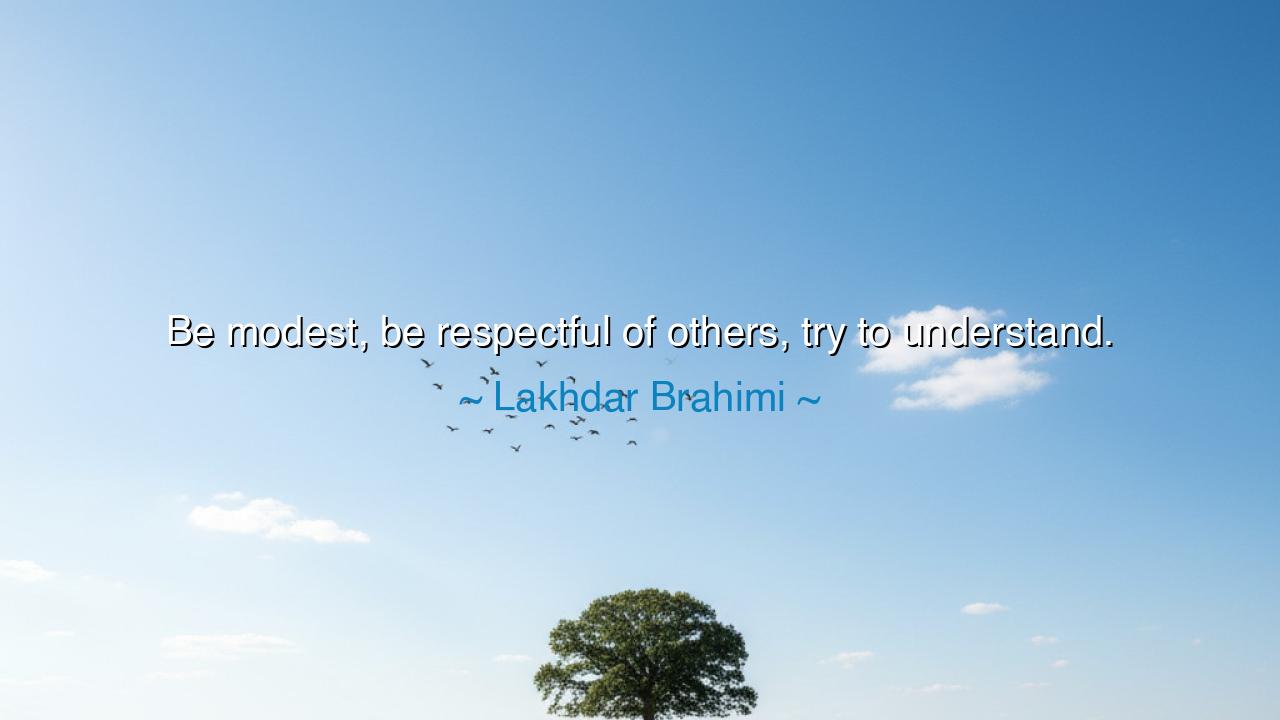
Be modest, be respectful of others, try to understand.






The words of Lakhdar Brahimi, “Be modest, be respectful of others, try to understand,” rise with the simplicity of water and the strength of stone. They do not dazzle with ornament, yet they carry the weight of civilizations, for in their humble cadence is contained the essence of peace. To be modest is to walk without arrogance, to remember that no matter how high one climbs, all men and women remain bound by the same earth, the same breath. To be respectful of others is to recognize in every soul a spark of dignity, whether cloaked in riches or rags. And to try to understand is to lift oneself beyond judgment into the realm of compassion, where the heart listens before the tongue speaks.
Brahimi himself, a diplomat and peacemaker, shaped these words not in the quiet of philosophy alone, but in the crucible of conflict. From Lebanon to Afghanistan, he stood amid ruins where pride had sown destruction, where disrespect had shattered bonds, where misunderstanding had fueled war. In these ashes he discovered that peace is not born in treaties of power alone, but in the simple virtues of humility, respect, and understanding. His words echo the wisdom of the ancients: true strength is not domination, but self-restraint; true victory is not conquest, but reconciliation.
The ancients revered modesty as the mother of wisdom. In Greece, hubris—the swelling pride of men who thought themselves gods—was always punished by Nemesis. The great tragedies taught that arrogance blinds the mind, while modesty clears the way for truth. So too in every tradition: in the teachings of Confucius, humility is the mark of the noble man; in the words of Christ, the meek shall inherit the earth. To be modest is not to be weak, but to be strong enough to set aside one’s ego, to allow space for the dignity of others to flourish.
To be respectful of others is to uphold the sacred law of human kinship. History reveals the cost of neglecting this principle. When rulers scorn their people, revolutions ignite. When societies despise outsiders, wars erupt. Yet when respect is shown even to the lowly, bonds are strengthened. Consider Abraham Lincoln, who spoke with courtesy to all, even to those who despised him. His respect disarmed hatred, transforming enemies into allies. Respect is the foundation of justice, the recognition that no one stands above another in worth.
And to try to understand is the highest of these three commands. For in misunderstanding lies the root of strife, but in seeking to comprehend, bridges are built. Gandhi once said that peace does not mean the absence of conflict, but the ability to handle conflict with understanding. Even in bitter opposition, to strive to see the world through the eyes of another is to plant the seeds of harmony. Empires may be held by force, but only understanding holds the human heart.
The heart of Brahimi’s teaching is this: peace begins not in grand speeches or mighty armies, but in the humble posture of one who listens, honors, and restrains the self. These three—modesty, respect, and understanding—are not small virtues, but heroic ones, for they require the courage to master pride, the discipline to honor the other, and the patience to look beyond oneself. Without them, no home can be happy, no nation can be stable, no world can endure.
The lesson for us is clear: if you would walk the path of wisdom, adorn yourself first with modesty—do not boast of what you are, let your deeds speak. Then walk with respect, treating every soul you meet as if they bore a crown. And finally, strive always to understand, listening more than you speak, seeking truth more than victory. These small acts, practiced daily, can transform the storms of life into calm, and turn enmity into friendship.
Thus the words of Lakhdar Brahimi endure: “Be modest, be respectful of others, try to understand.” They are a lamp for every generation, a shield against pride, a bridge across division. Let them guide you, that you may not only live in peace, but become a bearer of peace to all who cross your path.






AAdministratorAdministrator
Welcome, honored guests. Please leave a comment, we will respond soon